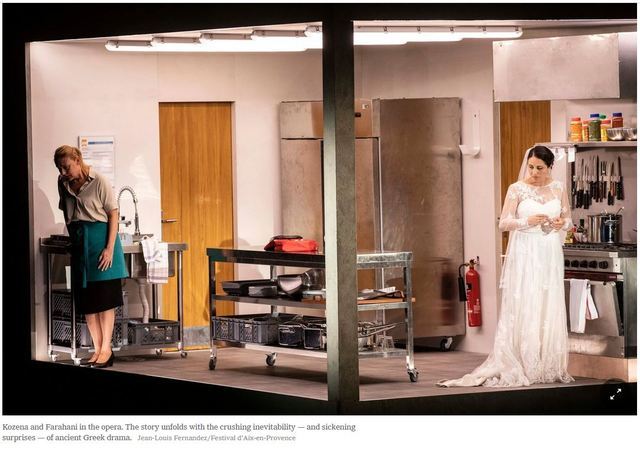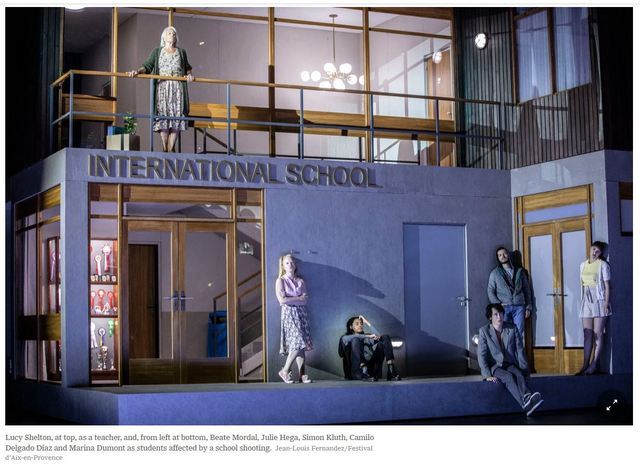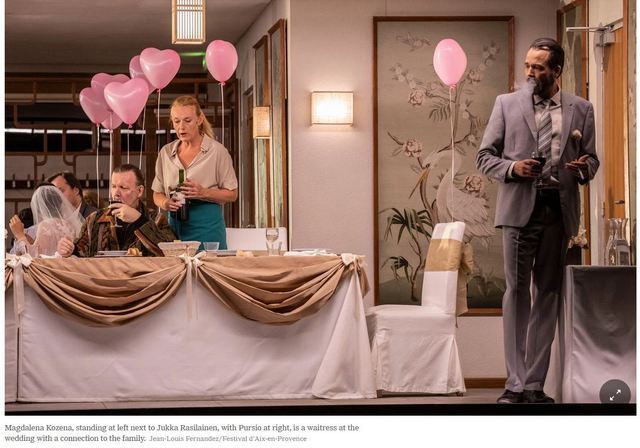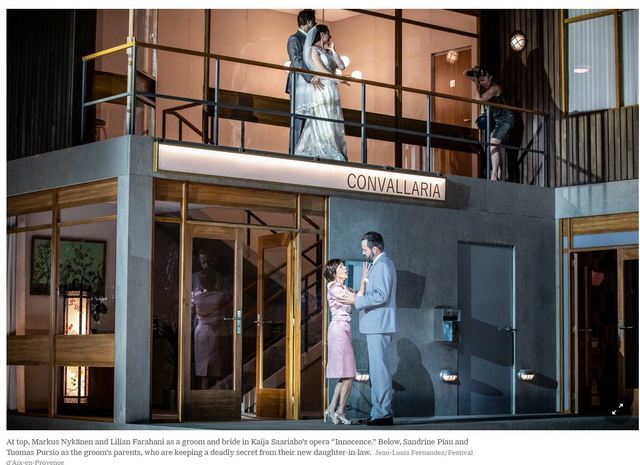Kaija Saariaho’s grand yet restrained new opera about a tragedy and its reverberations is the most powerful work of her five-decade career.




By Zachary Woolfe
July 7, 2021
AIX-EN-PROVENCE, France — “Innocence,” the new opera by Kaija Saariaho, begins in soft, somber gloom. A shadowy mist of cymbal rises off long, sepulchral tones down in the basses and contrabassoon, before a keening fragment of bassoon pierces the quiet with melancholy song.
It’s just a few seconds of music, but a mood has been established — comprehensively, unforgettably, yet subtly. Before we know the plot of “Innocence,” we feel it: Something dark and deep has happened, from which memory vibrates into an uncertain future, etched with mourning.
We keep feeling it over the hundred minutes that follow, as we come to know intimately a tragedy and its reverberations. Grand yet restrained, a thriller that is also a meditation, “Innocence” is the most powerful work Saariaho has written in a career now in its fifth decade.
Appearing through July 12 here at the Aix-en-Provence Festival (and streaming on arte.tv on Saturday) after its planned debut in 2020 was canceled, it would be the premiere of the year even in a normal season — even if its audience were not so hungry for real, big, important, live opera after so many months largely without. It deserves to travel far beyond an already global itinerary: Helsinki, Amsterdam, London, San Francisco, the Metropolitan Opera in New York.
This is undoubtedly the work of a mature master, in such full command of her resources that she can focus simply on telling a story and illuminating characters. Unlike so many contemporary operas, “Innocence” — featuring the mighty London Symphony Orchestra, conducted with sensitivity and control by Susanna Malkki — doesn’t feel like a sung play with a more or less disconnected, elaborately self-regarding orchestral soundtrack.
In fact, during the performance I attended, on Tuesday, I periodically tried to listen exclusively to the instrumental lines and their interplay, but despite the obvious virtuosity and density of the score, my ears kept lifting back up to the stage, to the lucid, inexorable action, the integrated theatrical whole. Porous and agile; simmering beneath and around the voices; and only occasionally, briefly exploding, this is music as a vehicle for exploring and intensifying drama. It is complex, yet confident enough to exist not merely for its own sake.
With a libretto by the Finnish writer Sofi Oksanen, and translation work on more than a half-dozen languages by Aleksi Barrière, “Innocence” is set in 21st-century Helsinki, where there has been a deadly shooting at an international school. The action continually shifts back and forth between a recollection of the disaster, by six students and a teacher who went through it, and a wedding party happening 10 years later.
It quickly becomes obvious that the two events are linked. The groom is the shooter’s brother, and his family, which has been ostracized and is desperate to move beyond what happened, has kept the whole thing from the bride. (If that wasn’t enough, there’s a reason a waitress has been skulking around, jaw clenched, on the nuptial sidelines: She is the mother of one of the victims.)
There is ample operatic precedent for an innocent young woman guided blindly by her lover into a world of violence and deception: Think of Bartok’s “Bluebeard’s Castle” and Debussy’s “Pelléas et Mélisande.” “Innocence” recalls those, as well as the ferocious economy of Berg’s “Wozzeck” and Strauss’s “Elektra” in its relatively modest, intermissionless length.
But “Innocence” is very much of our time, and — in its play of multiple languages and registers of speaking and singing — very much itself. Saariaho gave it the working title “Fresco”; it was inspired, she has said, by “The Last Supper,” from which she derived the size of the cast (13 soloists) and the piece’s broader questions of culpability and the linked yet separate experiences of people who have shared a trauma.
Members of the wedding party sing: the groom, a tenor, in boisterous exhortations; the bride, a soprano, with sweet lyricism. A priest, the only friend the family has left, murmurs ominously about the faith he has lost.
The surviving students and teacher, on the other hand, speak — though in precise rhythms artfully tailored to their respective languages of Czech, Swedish, French, German, Spanish, Greek and English. The waitress’s daughter, Marketa (a memorably rapt Vilma Jaa), appears as a kind of phantom, singing in the eerily plain style of Finnish folk music. The Estonian Philharmonic Chamber Choir chants offstage, a hint of a world beyond the fevered hothouse of the plot. All these disparate vocal worlds are linked by the orchestra, which wraps around the singers lightly and sleekly — never explicitly underlining them, never competing.
The cast matches Saariaho’s score in its commitment and discipline, its refusal to fall into overplaying or Grand Guignol. As the waitress, Magdalena Kozena is a laser beam of pain; as the mother of the groom, Sandrine Piau conjures the uncanny effect of a voice thinned to a thread by suffering.
Saariaho’s past operas — starting with the stylized medieval parable “L’Amour de Loin” (2000) — were mostly collaborations with the director Peter Sellars, who lends even canonical works the abstraction of ritual. Here, though, she benefits from a hypernaturalistic staging by Simon Stone, whose style anchors “Innocence” in reality without stinting its surreal fluidity. (Chloe Lamford’s rotating, ever-mutating two-story set, an anxiety-inducing amalgam of school and restaurant, is a crucial player in the drama.)
The story unfolds with the crushing inevitability — and sickening surprises — of ancient Greek drama. Varying degrees of guilt slowly seep outward from the shooter to encompass even seemingly blameless characters. A gun was inadvertently provided; suspicious behavior went unreported; a boy was mercilessly teased and assaulted.
This is not an unfamiliar plot, and like any superb opera, “Innocence” would seem flat if its text were delivered as a play. That it instead has brooding nuance is thanks to the music; the varieties of vocalization; Saariaho’s intimation, even as she delivers a clear story, that there is much beyond what is enunciated. Opera, as it always has been, is here a home for emotions that could come across as flatly, implausibly extreme, but which are rendered newly mysterious and natural.
“Innocence” also gains depth from the politics and history from which it has emerged. Watching events of this kind, in this period, unfold in and around an international school, it is hard not to think of Europe itself, and of its formation as a union in the wake of unspeakable violence. There was a dream that trauma would prove unifying; we have witnessed the gradual realization that the opposite is true. In transitioning from the before times — native languages and folk song — into the lingua franca of English and musical modernism, this onstage society seems to have gained little. Certainly not the ability to fully integrate new members, to function.
Yet the opera’s final moments are not without a certain hopeless hopefulness. The students describe small steps they’ve taken to move beyond the tragedy; the vision of the daughter asks the waitress to stop buying her birthday presents, to let her go. The music seethes sadly at this, but the dissonance passes through a sublime moment of consonance — courting sunshine — before drifting back into tension, then transpiring upward into pure shimmer, almost toneless. It is both through and beyond music, then, that Saariaho arrives at an ending that is, if not happy, strangely, completely exhilarating.
https://www.nytimes.com/2021/07/07/arts ... a-aix.html